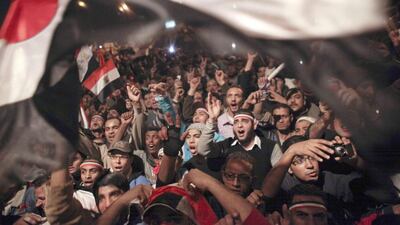The UAE has been on high alert since the regional unrest that began in 2011, an event that has resulted in major security threats for the country, said the emergency management chief.
The uprisings in Syria, Yemen, Egypt, Tunisia and Algeria “led to the deterioration of security, slowed down the development in those countries and increased tension in the Arab region”.
Dr Jamal Al Hosani, the director general of the National Emergency, Crisis and Disaster Management Authority, added: “Everyone, including the GCC, suffered from the repercussions of this wave of unrest. Everyone is worried about what’s happening outside but we don’t like to panic people, so we’re considering what’s going on around us - we’re sitting in a good place and we’d like to keep it that way but we shouldn’t be naïve about what’s happening around us.”
He said the unrest has caused a number of profound changes to the region.
“Some countries remained coherent, while others have been shaken and have become a hotbed of terrorism and breeding grounds for extremism,” said Dr Al Hosani.
“The conflict between political interests intensified, opening the door to the intervention of countries in the affairs of other countries, and we [cannot] forget the tense economic conditions, which impacted their development, especially after the unexpected drop in the price of a barrel of oil.”
Iran is fuelling security tensions and manipulating the political compass, he added.
“Tehran's destructive role by supporting terrorism and stirring up sectarian strife and conflict threatens the security of nations, harms their economies and increases the chances of crises,” Dr Al Hosani said. “But it is important to establish close cooperation with each other on the basis of a common system of allied countries to ensure our country’s security and to help overcome the challenges it could face in light of its geographical position or economic position in these tough times.”
Analysts said that Iran represented the only conventional military threat to the UAE. “The UAE built its defence industry as a reaction to this threat and Iran’s quantitative advantage is now balanced by the UAE’s qualitative edge and a number of international security alliances,” said Marc Martinez, from the Abu Dhabi think tank The Delma Institute.
“Other security concerns are terrorism and political Islamism. The so-called Arab uprisings have been a significant source of regional instability in creating a number of safe havens for extremists in Iraq, Syria, Libya, and Yemen, which forced the UAE to be more assertive in addressing these threats.”
He said the UAE’s strategy had been so far successful. “It used its conventional military forces to fight terrorists abroad in Afghanistan, Syria, Libya and Yemen, and it also developed an innovative approach to counter violent extremism with the creation of Hedayah and the Sawab Centre,” Mr Martinez added.
“But, as the UAE is increasing its regional presence out of the Arabian Peninsula, the country will have to factor in the defence of its interests abroad.”
Read more:
> UAE disaster alerts to be received on smartphones in bid to save lives

